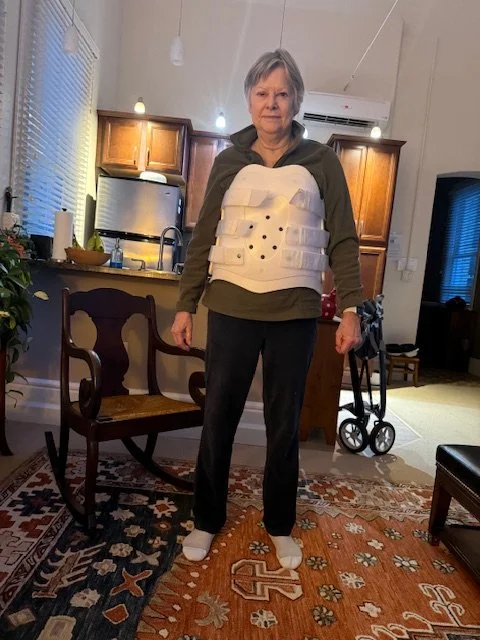This brace! I have to wear it every moment I’m upright. I stay fearful that I’ll twist or bend too far, breaking the rules. How long, I’m not sure. Six weeks at least.
It’s amazing to be knocked out for several hours and wake up with a redesigned back. I hurt, some days worse than others, but nothing I can’t live with, mostly on Tylenol. After my previous experience with Big Drugs (see My Wobbly Bicycle, 288), I’ve been reluctant to take the oxycodone. Too reluctant. I let myself suffer needlessly. “Stop that,” I say to myself. “No need to be a martyr.”
I was told to rest for the first month after surgery. Good thing, because I don’t feel like doing anything. One day in rehab I felt so good I walked the long halls again and again, and paid for it the next two days with increased pain. I’m still using the walker for a while. When I’m allowed to go to PT, I can strengthen my hips so that normal walking won’t hurt.
Dear Mash: I miss you guys/gal.
What did I do in “rehab”? Watched worthless TV. “The Ugliest House in America,” TVLand, “Mash,” watched people build and re-build and paint all manner of things—anything with barely a narrative that allowed me to drift. I did not one speck of “work.” Slept a lot. Got our lovely children to bring me meals from Cordia when possible. All four were here, in succession. They ran errands, took care of Jerry, and cheered me up immeasurably.
This is an argument for turning off the mind for a while. For allowing the world to overwhelm the executive function, for becoming a child tucked in bed. I’ve done that all my life, to some extent. Getting “sick” so I had to miss school, to rest my brain. Although this time was a whopper compared to the others.
Meanwhile, I’m making plans. Would you like to have a Zoom book club meeting about “The End of the Clockwork Universe”? I’ll read some poems, and offer some questions for us to talk about. The price of admission would be simply holding up a copy of the book to show that you bought it. I’d love to do that, especially while the weather is wretched enough to want to be indoors. We can have a great time with this book together. Go to “Comments” and just say “yes,” and I’ll set it up.
Also—and I haven’t talked much about this yet—in June I have a diary coming out (pre-sales a lot earlier) about the angst of moving into a senior living residence. I figure there should be a lot of talk around this one, especially among my contemporaries. I wrote it in five months—it’s truly a diary—up to the time I started to feel comfortable here. I’d like to set up some Zoom meetings about that one. I figure a lot of people my age may be interested in my random musings. The price will be the same—just hold up the book to show you bought it. That would be in June.
Please let me know you’re interested in either or both. If there are too many people for a good discussion, I’ll offer them twice.
Good morning to you.
Meanwhile, I slowly get better. Jerry shuffles along with his increasingly bent back, his awkwardness of gait, I wear my gigantic white brace, stabbed in the back until yesterday, thank God, with seventy staples. Jerry and I, each of us trying to hold the other up through the collapsing of the body. I am fully aware what a privilege it is to have been together so long (35 years this summer) that we function as one smooth unit. And I’m increasingly aware of time’s winged chariot, which makes the moments we still have together positively glitter with significance.



